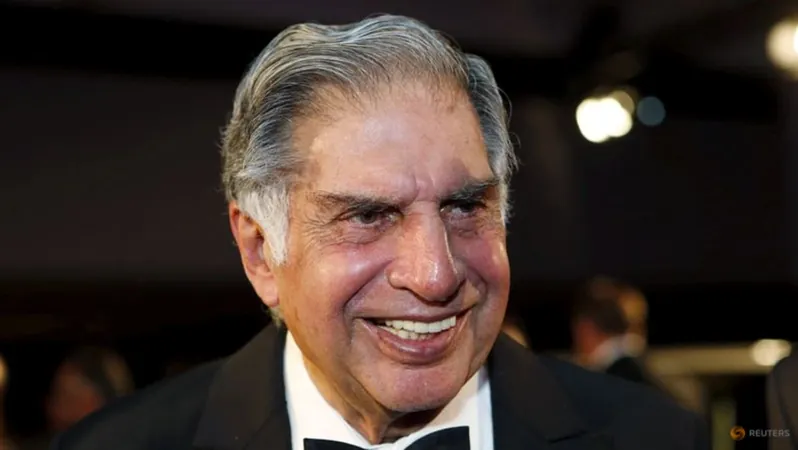
Ratan Tata, the Pioneer Behind India's Global Business Surge, Passes Away at 86
2024-10-09
Author: Nur
In a monumental loss for India and the business world, Ratan Tata, the iconic former chairman of the Tata Group, has died at the age of 86. His passing was confirmed by the Tata Group in a statement released on October 9, 2023. Tata, who significantly globalized the company his great-grandfather had founded, had been receiving intensive care in a Mumbai hospital prior to his passing.
The Tata Group expressed its sorrow, stating, “It is with a profound sense of loss that we bid farewell to Mr. Ratan Naval Tata, a truly uncommon leader whose immeasurable contributions have shaped not only the Tata Group but also the very fabric of our nation.”
Indian Prime Minister Narendra Modi took to social media to honor Tata's legacy, calling him “a visionary business leader, a compassionate soul, and an extraordinary human being.” Modi expressed his deep sadness and extended his condolences to Tata's family, friends, and admirers.
Ratan Tata completed his degree in architecture at Cornell University in the 1960s before returning to India to join the Tata Group, which was established nearly a century earlier. Over the years, he made transformative changes, leading to the rejuvenation of the conglomerate's various enterprises, including Tata Steel and Tata Motors.
Assuming leadership of Tata Group in 1991, Tata took charge during a pivotal time when India began liberalizing its economy. One of his first actions was to enforce age limits on company executives and promote a younger generation of leaders, a controversial yet strategic move that revitalized the organization.
Under his guidance, the Tata Group embarked on a remarkable path of international acquisition, which included high-profile purchases such as the British tea company Tetley and Anglo-Dutch steelmaker Corus—signifying India’s rising influence on a global scale. The acquisition of luxury car brands Jaguar and Land Rover from Ford in 2008 demonstrated Tata’s commitment to enhancing the Group’s portfolio on the world stage.
Ratan Tata was also a proponent of innovation, leading to the development of India's first domestically produced car, the Indica, and the Nano, which was aimed at providing an affordable vehicle for the masses. Although the Indica achieved commercial success, the Nano faced challenges, eventually leading to its discontinuation.
Beyond his corporate achievements, Tata was known for his humble lifestyle, philanthropic endeavours, and passions, including aviation, where he held a licensed pilot status. He was dedicated to social causes, with a large percentage of Tata Sons’ share capital held by charitable trusts, illustrating his commitment to giving back to society.
His departure has left a significant void in the Indian business landscape, further emphasized by the controversial public dispute following the ousting of Cyrus Mistry as chairman in 2016. This event marked a turbulent chapter in the Tata Group's history, signaling the complexities of corporate governance in a rapidly changing business environment.
After stepping back from daily operations, Ratan Tata transitioned into an influential angel investor, championing numerous startups across technology and service sectors, including prominent firms like Paytm and Ola Electric. His contributions to trade and industry earned him accolades, most notably the Padma Vibhushan, India’s second-highest civilian award, in 2008.
As the world mourns the loss of Ratan Tata, his legacy as a catalyst for change in India’s global business narrative will undoubtedly endure, influencing generations to come.



 Brasil (PT)
Brasil (PT)
 Canada (EN)
Canada (EN)
 Chile (ES)
Chile (ES)
 España (ES)
España (ES)
 France (FR)
France (FR)
 Hong Kong (EN)
Hong Kong (EN)
 Italia (IT)
Italia (IT)
 日本 (JA)
日本 (JA)
 Magyarország (HU)
Magyarország (HU)
 Norge (NO)
Norge (NO)
 Polska (PL)
Polska (PL)
 Schweiz (DE)
Schweiz (DE)
 Singapore (EN)
Singapore (EN)
 Sverige (SV)
Sverige (SV)
 Suomi (FI)
Suomi (FI)
 Türkiye (TR)
Türkiye (TR)